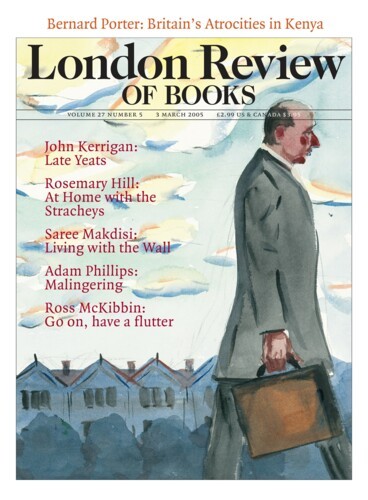I once had a teacher who was known for taking a more than professional interest in some of his pupils, especially the boys in the school cricket team. Too short-sighted to see an incoming cricket ball until it was inches from my face, by which time it was too late to do anything more useful than flinch out of the way, I was never one of those he liked to tickle as he strolled about the classroom – unlike my friend G. One of the faster under-13 bowlers in the county, he was also fairly adept at rebuffing unwanted attention. At breaktime one day, the teacher approached him in the playground, and said they needed to talk: ‘I think our relationship’s been going downhill recently,’ he murmured. ‘What relationship?’ G. replied, and walked away.
I was reminded of this exchange by Tony Blair’s speech at the Labour Party Spring Conference in Gateshead on 13 February. ‘I think a lot about my relationship with the country,’ he said. ‘And it’s not a bad idea to think of it in terms of it being like any relationship: you, the British people, and me, the person you chose as your prime minister’ – the implication being, for better, for worse; for richer, for poorer; in sickness and in health. It seems quite weird, maybe even a bad idea, to think of the relationship between a national electorate and its leader in those terms, as if the general election in May were somehow a showy matrimonial sequel to the royal yoking due in April. Especially when Blair’s speech leaves little doubt as to who’s wearing the trousers: and it’s not the British people. ‘Decent’ and ‘hard working’ we may be, but we’re the ones who’ve been getting hysterical and occasionally ‘throwing a bit of crockery’; Mr Blair, on the other hand, is being Mr Reasonable, saying we ‘have to sit down and decide’ whether to stay with him or ‘go off with Mr Kennedy’ or Mr Howard.
Even those who’ve so far restrained themselves from hurling plates at him might feel tempted to by the cringeing hi-honey-I’m-hominess of ‘I’m back. And it feels good.’ Back from where, precisely? On one level, from ‘a tremendous time on Friday touring the country’. Apparently he ‘loved every moment’ of that absurd helicopter trip, hopping north from town to town, with a pledge in every port of call. But back too from the bender he’s been on with his pal Mr Bush, the pair of them staying out late, starting fights and getting into trouble. But the decent, hard-working people of Britain ought to forgive him for that: ‘On some issues, sometimes you just have to agree to disagree, like Iraq.’ (He claims to have given up thinking ‘I know best’ in favour of ‘we can only do it together’; but ‘let’s agree to disagree’ is only ever a more tactful way of saying ‘I know best.’) He almost seemed to expect the party faithful to launch into a spontaneous chorus of ‘Stand by Your Man’. Tony Blair and his many million wives: we’re not an electorate, we’re a harem.
Marriage, at any rate for good Christians like Blair, symbolises the ‘mystical union between Christ and his Church’. And there’s something creepily atavistic about a prime minister representing his position in relation to the electorate in such terms, however ‘modern’ the marriage may be said to be, and however much this is the way in which focus groups have suggested we would like him to talk. He’s supposed to be the leader of a parliamentary democracy, not a messianic cult.
What makes it worse is that the speech did not begin too badly: ‘Here in Gateshead, in 1997, primary schools had only half of their 11-year-olds with the proper reading skills. Now it’s 78 per cent . . . Long-term unemployment was over 2500. Now it’s about 400 . . . There is still poverty. There is still hardship. There are still too many lives untouched by change.’ (In other words, things are obviously far from perfect, but they have got a bit better under Labour.) Things started to go seriously wrong, however (with the speech, rather than the administration), when Blair told his audience that, ‘as ever, a lot of it is about me.’ This was the cue for him to jaw on about himself at great length, ensuring that most of the media coverage would do the same. According to a poll published in the Independent in January, Labour would do better at a general election under Gordon Brown’s leadership. Never mind the good of the country: if Blair really cared more about his party staying in government than about himself staying in Number Ten, he wouldn’t still be there.
Send Letters To:
The Editor
London Review of Books,
28 Little Russell Street
London, WC1A 2HN
letters@lrb.co.uk
Please include name, address, and a telephone number.

